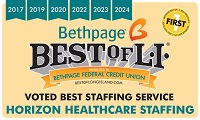RN vs BSN: What’s the Difference?
If you’re considering a career in nursing or have ever contemplated it, you’ve more than likely come across the terms RN and BSN. For those that don’t have much knowledge about the nursing field, these two terms may come across as two entirely different positions. However, they are quite intertwined and only have slight differences. By understanding the differences between the two, it will help you determine which path aligns best with your career goals, timeline, and personal priorities. In this blog we will dive into everything you need to know about RN vs BSN and their differences.
What is an RN?
A Registered Nurse, or RN, is a licensed nursing professional. RNs are responsible for a wide variety of patient care activities, including but not limited to, administering medications, taking vital signs, and working with other healthcare professionals such as doctors. It’s important to note that becoming an RN does not require earning a bachelor’s degree, although many nursing students take this route to earn their RN license. For those whose goal is to become an RN in the fastest way possible, going through an associate degree in nursing (ADN) program is the way to go.
What is a BSN?
Contrary to popular belief, a BSN is not a different nursing license from an RN, but rather a nursing degree/education difference. BSN stands for a bachelor’s degree of science in nursing and is a four-year education program. Some BSN programs lead to RN licensure whereas other BSN programs are designed for already licensed RNs seeking to enhance their education. While it is not required to have a BSN educational background for many states, it is required in the state of New York to earn your RN license through a BSN program. This is due to the BSN in 10 law that was signed back in 2017 and put into effect in 2019. It’s safe to assume that in the future there will be other states that will put the same law into effect.
The difference between an ADN program and a BSN program is that BSN programs dive deeper into topics such as nursing theory, leadership, and evidence-based practice. The BSN program not only educates and prepares nursing students on how to be excellent nurses but also to take on administrative roles, teach, or pursue advanced nursing roles.
RN vs BSN: Education Requirements
Pathways to Become an RN:
- Associate Degree in Nursing (ADN): Taking the ADN route towards becoming an RN is faster than the BSN route. Typically, these programs take around 2-3 years to complete and is based on core clinical skills.
- Bachelor of Science in Nursing (BSN): Earning your BSN generally takes 4 years to complete, making it a little longer to earn the RN credential. The BSN degree encompasses the clinical aspect of an ADN with additional coursework, including but not limited to, public health, leadership, and research.
No matter which educational pathway you choose, you will have the opportunity to take and pass the NCLEX-RN to earn your license. A BSN is just another classification of the RN credential due to the additional education they received.
RN vs BSN: Salary Difference
There are many different factors that determine pay such as education level, amount of experience, and even location. For an RN that has completed a BSN program, it is more likely that they will start off with a higher salary than those that have an ADN. According to Payscale, the average yearly salary for an RN who completed the ADN program makes an average of $78,000 whereas an RN who completed a BSN program makes an average of $95,000. Those that have a BSN education level also have more opportunities to advance into other specialties, making it easier for them to grow both professionally and financially.
Conclusion
In conclusion, both the ADN and BSN paths lead to an extremely rewarding career in nursing. However, the differences in the two programs cater to different needs and goals of the nursing student. If you’re looking to enter the nursing field as an RN more quickly, then the ADN program path might be your best bet. On the other hand, if you’re looking to advance your career as a nurse as quickly as possible, the BSN path may be best. No matter which path you choose, there are always opportunities to grow and advance in your career. If you’re looking for an RN job in NY or NJ, send us your resume today!


